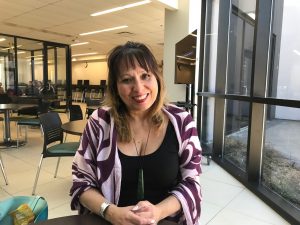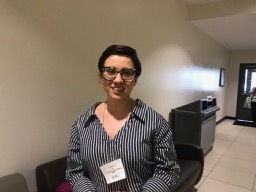Loyalist College hosts workshop on storing Indigenous knowledge

“We need to walk beside each other – not in front or behind – on this road to reconciliation because that’s the only way we’re going to make a difference in Canada…” Camille Callison Photo by Sarah Cooke, QNet News
By Sarah Cooke
BELLEVILLE – Decolonizing how Indigenous knowledge is stored in current archiving systems in Ontario is an important step towards reconciliation.
That’s one of the recommendations in the Truth and Reconciliation Commission of Canada: Calls to Action.
It was also the focus of a workshop hosted by the Archives Association of Ontario on Wednesday at Loyalist College where expert Indigenous archivist Camille Callison came and spoke to archivists from all over the province.
Callison, 54, of the Tsesk’iya clan of the Tahltan nation from northern British Columbia has studied anthropology, did a year of archival studies, and has worked in the library at the University of Manitoba.
Callison said she realized it was crucial to gather and preserve Indigenous knowledge in an appropriate and accessible manner.
“The concept of archives is not foreign to Indigenous People. In fact, I’d say it’s very compatible with the way we get our knowledge; even though we are a culture of orality we always were able to pass things down in an archival form to the next generation.” said Callison.
Callison’s workshop talked about making content available and adapting archival systems so that it’s easier for Indigenous People to search for information. She said that prior to colonization Indigenous communities didn’t separate their knowledge into libraries, archives or museums.
“It’s much more holistic and connected to our land, to our water, so we need to think about things not in a colonial construct but as holistic Indigenous knowledge.” said Callison.
Having access to knowledge stored in archives has been helpful for recovering history that has been lost during the residential school era such as land holdings, customs and language she said.
“The way we find out about certain knowledges that have been lost is that we go into the archives that have the older languages – the university level of our languages, of our customs and who we are as a people and I think that’s so important.” Callison said in an interview with QNet News.
Callison empathizes that it’s about relationship building going forward and working with the communities who may have ownership of items archived.

“It’s an incredibly intimidating thing and the emotional part of you becomes very involved,” said MacKenzie Gott. Photo by Sarah Cooke, QNet News
MacKenzie Gott, 30, who is a digital heritage officer at the Canadian Research Knowledge Network, was one of the people who attended the workshop.
“It’s incredibly important for us to understand the ethics of digitization and how we can engage with the community,” said Gott.
Leo Joy-Clark, 37, works at the Mississippi Valley Textile Museum in Almonte, Ont., and is pursuing a masters degree in archives and records management. He thought attending the event was the responsible thing to do as he studied for his career in archiving.
“I need to be responsible and trained to be able to handle historic records from a community that had been here taking care of the land and had it stolen by my people,” said Joy-Clark.
So how do archivists plan to move forward?
“I have a lot of ideas from our afternoon workshops,” Gott smiled when asked about going forward. “First thing we’ll do is assess our collection and look at mainly the communities that are addressed in our collection and hopefully start to address who we can connect with in that community to address ownership.”
Joy-Clark said that the Mississippi Valley Textile Museum has just begun assessing its collection and looking into seeing if they have the rights to tell the story of objects or information that they have and, if not, who they can give it back to.
Moving forward in reconciliation with Indigenous People requires that the truth be told; adapting how information is archived and how ownership is decided helps keep the truth from being buried said Callison
“It’s about relationships,” Callison said. “When you create healthy relationships with Indigenous People in their communities, that’s how we move forward.”
 Print This Post
Print This Post






